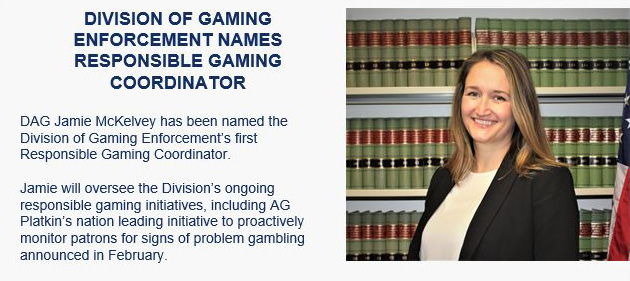
If you or someone you know has or may have a gambling problem, please: |
||
|
Call: 1-800-GAMBLER |
Chat: Online |
Find a Meeting: In Person |
If you or someone you know has or may have a gambling problem, please:
Call:
1-800-GAMBLER
Chat:
Online
Find a Meeting:
In Person
General Responsible Gaming Information
Responsible gaming refers to a set of policies and practices that aim to promote safe and enjoyable gambling experiences while minimizing the risk of harm to individuals and society as a whole. The New Jersey Division of Gaming Enforcement (DGE) works closely with licensed casinos and online gambling operators to promote responsible gaming and protect players.

- Myths Associated with Gambling
- Risks Associated with Gambling
- Tips for Parents
- Potential Signs of a Gambling Problem
- Practical Tips for Responsible Gambling
Myths Associated with Gambling
Players often believe in false myths regarding gambling. While the list below is by no means an exhaustive list of gambling myths, some of the more commonly held myths are:
• A player’s luck changes the more he gambles.
• If a player increases the value of his bets, he will win his money back.
• That a player can have a lucky day.
• Tracking previous results can help a player forecast the coming results.
• If a player plays on more than one casino game or in more than one poker game at a time, he will increase his chances of winning.
• That a player can develop a special strategy that will help him win.
• Knowing a game well will increase a player’s chances of winning.
• It’s not possible to become addicted to something like gambling.
• To be a problem gambler a player has to gamble every day.
• If a player can afford to gamble, then he can’t be a problem gambler.
• Only irresponsible people become addicted to gambling.
• Problem gambling is easy to recognize.
• Gambling is a way to make money.
Risks Associated With Gambling
Gambling can have an impact on a player’s life, some of the risks associated with gambling are:
• Losing more money than you budget for.
• Spending more time gambling than you intend.
• Neglecting loved ones.
• Declining self-esteem.
• Increased stress and anxiety.
• Developing a preoccupation with gambling.
• Placing increasingly larger bets in order to get a rush.
• Gambling to escape or to improve your mood.
• Playing to escape from reality.
• Heightened states of euphoria which may affect your judgement.
Tips for Parents:
• Do not leave children unattended near your computer when you are logged into your 888.com Platform real-money account.
• Do not allow persons under 21 to participate in any gambling activity.
• Educate your children about the illegality and potential dangers of underage gambling.
Potential Signs of a Gambling Problem
The following highlights a number of questions a player should ask himself and his loved ones to help identify potential signs of a gambling problem. While these questions are not a diagnostic, psychological, or medical test and should not be used as such, many people who have called gambling help lines have answered yes to one or more of the following questions:
• Do you lose time from work due to gambling?
• Is gambling making your home life unhappy?
• Is gambling affecting your reputation?
• Have you ever felt remorse after gambling?
• Do you ever gamble to get money to help pay debts or solve other financial difficulties?
• Does gambling decrease your ambition or efficiency?
• After losing, do you feel you must return as soon as possible to win back your losses?
• After a win, do you have a strong urge to continue and win more?
• Do you often gamble until your last dollar is gone?
• Do you ever borrow to finance your gambling?
• Have you ever sold any real estate or personal property to finance gambling?
• Are you reluctant to use “gambling money” for normal expenditures?
• Does gambling ever make you careless about the welfare of your family?
• Do you ever gamble longer than you had planned?
• Do you ever gamble to escape worries or trouble?
• Have you ever committed or considered committing an illegal act to finance gambling?
• Does gambling make you have difficulty sleeping?
• Do arguments, disappointments, or frustrations create an urge to gamble?
• Do you have an urge to celebrate good fortune with a few hours of gambling?
• Have you ever considered self-destructive behavior as a result of your gambling?
Problem Gambling Warning Signs
• Having arguments with family or friends about money and gambling
• Losing interest in your usual activities or hobbies, like going out with friends or spending time with your family
• Always thinking or talking about gambling
• Lying about your gambling or hiding it from other people
• Needing to gamble with larger amounts of money or for a longer time to get the same feeling of excitement or buzz
• Neglecting work, university, family, personal needs or household responsibilities because of gambling
• Feeling anxious, worried, guilty, depressed, or irritable
Practical Tips for Responsible Gambling
Moderation is the key for all who gamble.
• The decision to gamble is a personal choice. No one should feel pressure to gamble – from others or themselves.
• Gambling should not be perceived as essential to having a good time.
• Limits should be set before starting to gamble. Money spent on gambling should be considered the cost of entertainment, not a source of income. People should gamble only with money they can afford to lose. A person who chooses to gamble should set time and monetary limits and adhere to them.
• There are times when people should not gamble. Certain emotional states can heighten the risks associated with gambling. Avoid gambling when feeling lonely, angry, depressed, stressed, or when coping with the death of a loved one. Similarly, gambling should not be used as a way to solve personal or family problems, or to impress others. Never gamble when it interferes with work or family responsibilities, when in recovery for addictive disorders or dependencies, when the gambling is illegal, or when trying to make up for prior gambling losses.
• Excessive use of alcohol when gambling can be risky. Irresponsibly using alcohol can affect a person’s judgment and interfere with the ability to adhere to predetermined limits.
• Balance gambling with other activities. When gambling becomes your only form of entertainment you should stop and consider whether you are still having fun.
• Take regular breaks from gambling. Gambling continuously can cause you to lose track of time and perspective.
• Timeout – if you need a longer break, consider taking a timeout. Request a timeout for any duration from 72 hours to a full year. While on timeout, you will not be able to deposit or wager. You may still log in, withdraw funds, and view your play history.
• Know how the games work before you wager.
• Do not take out loans and do not borrow money from other sources for gambling.
Self Exclusion Information
Please visit our page for all information about self-exclusion here.
“The Council on Compulsive Gambling of New Jersey works collaboratively with the DGE to offer the self-exclusion program covering Internet as well as land based casino gambling. This can be a very valuable tool for individual’s struggling with problems as result of their gambling. Anyone signing up for the program can take advantage of a free consultation with one of the professionals in our network simply by calling 1-800-GAMBLER helpline, or contacting us through our www.800.gambler.org website.” – Felicia Grondin, MPA, CPM Executive Director, The Council on Compulsive Gambling of New Jersey, Inc.
Annual RG Reports – Rutgers
All reports are prepared by Dr. Lia Nower, J.D., Ph.D., Director of the Center for Gambling Studies at Rutgers University.
| Internet Gaming: | Sports Wagering: |
Internet Gaming/Online Sports Wagering Best Practices
The following documents are provided as best practices:
Prevalence Report by Rutgers University
Online Responsible Gaming Regulations
| Regulation (external link to LexisNexis) | What it covers | Where it is implemented |
|---|---|---|
|
The message “If you or someone you know has a gambling problem and wants help, call 1-800-Gambler” must be on the login and log off screens.
|
Internet Gaming/Online Sports Wagering Systems | |
| If a patron has suspended his or her account, the casino cannot send gaming-related e-mail while the account is suspended. | Internet Gaming/Online Sports Wagering Systems | |
| The following must be on a patron protection page: Password help, filing complaints with the licensee and the DGE, a way to obtain a copy of the Terms and Conditions, a way to obtain account and game history, Underage gambling is a criminal offense notification, Patrons must enable auto-lock features notification, notification that a patron cannot let anyone else access their account, Federal Law Notification, Mobile Gaming exiting the property boundaries terminates the connection notification. |
Internet Gaming/Online Sports Wagering Systems | |
| Gaming systems cannot prompt you to continue to play when you are currently playing, trying to log off, or wins or loses a bet. | Internet Gaming/Online Sports Wagering Systems | |
| You will be able to access the player protection page at all times. | Internet Gaming/Online Sports Wagering Systems | |
| Each gaming site should display specific Responsible Gaming logos and information. You will always be able to get to the responsible gaming page. This page requires a specific 1-800-Gambler message, Direct link to the Council on Compulsive Gambling New Jersey, Inc., RG policy and commitment from the operator, RG information and tips, and the rules of self-imposed responsible gaming limits, and how to enable them. | Internet Gaming/Online Sports Wagering Systems | |
| There will always be a prominent way for you to close your account, and be refunded any balance. | Internet Gaming/Online Sports Wagering Systems | |
| The gaming system can suspend your account when you request it, DGE requires it, you are a prohibited person, or there is evidence of illegal activity, negative account balance, too many failed ACH deposit attempts, or a violation of the terms of service. | Internet Gaming/Online Sports Wagering Systems | |
| Gaming systems will allow you to self-impose a deposit limit, spend limit, and time-based limit. | Internet Gaming/Online Sports Wagering Systems | |
| When your lifetime deposits exceed $2,500, you cannot wager until acknowledge: you hit the deposit threshold of $2,500, you have the ability to self-impose responsible gaming limits or close your account, and you are aware of the 1-800-GAMBLER services. | Internet Gaming/Online Sports Wagering Systems |








































